Biology Homework 1: Climate, Conflict, and Food Security in Ethiopia
VerifiedAdded on 2022/08/21
|6
|1389
|33
Homework Assignment
AI Summary
This Biology homework assignment examines the multifaceted issue of food security in Ethiopia, focusing on the impact of climatic and non-climatic factors. The solution explores how temperature and precipitation, as key climatic elements, influence food production, availability, and affordability. It also addresses the impact of malaria, a significant health challenge, which exacerbates food insecurity by affecting people's financial capacity and ability to produce or purchase food. Furthermore, the assignment analyzes the role of conflicts, particularly between Ethiopia and Eritrea, in disrupting food supply chains and diverting resources away from food security initiatives. The solution also explains the criteria used by UN-OCHA and FEWSNET in identifying food security hotspots in Ethiopia, highlighting their roles in humanitarian assistance, early warning systems, and promoting effective responses to climate-related and other crises. The assignment underscores the complex interplay of environmental, health, and political factors that shape food security in the region, using scholarly references to support its arguments.
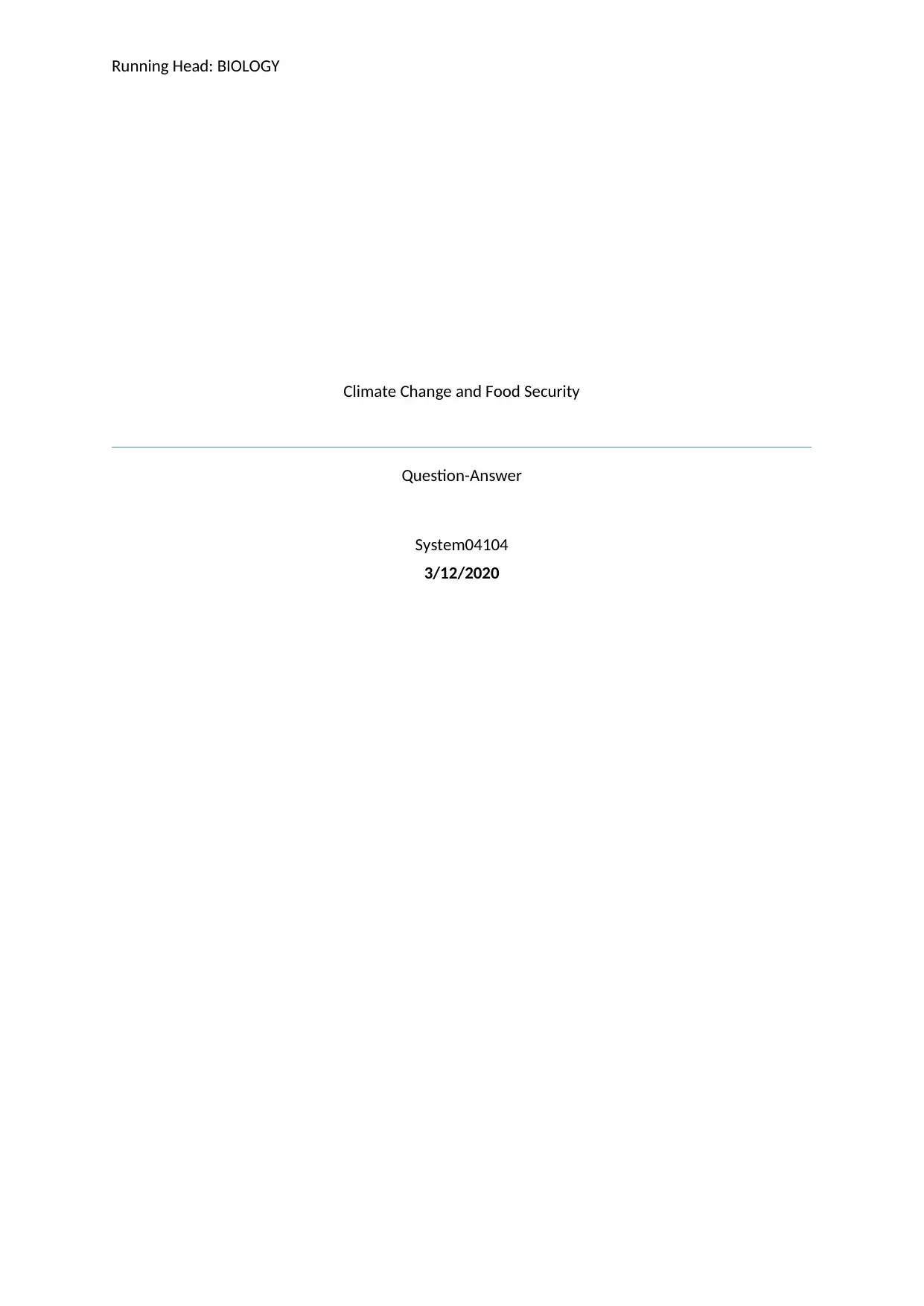
Running Head: BIOLOGY
Climate Change and Food Security
Question-Answer
System04104
3/12/2020
Climate Change and Food Security
Question-Answer
System04104
3/12/2020
Paraphrase This Document
Need a fresh take? Get an instant paraphrase of this document with our AI Paraphraser
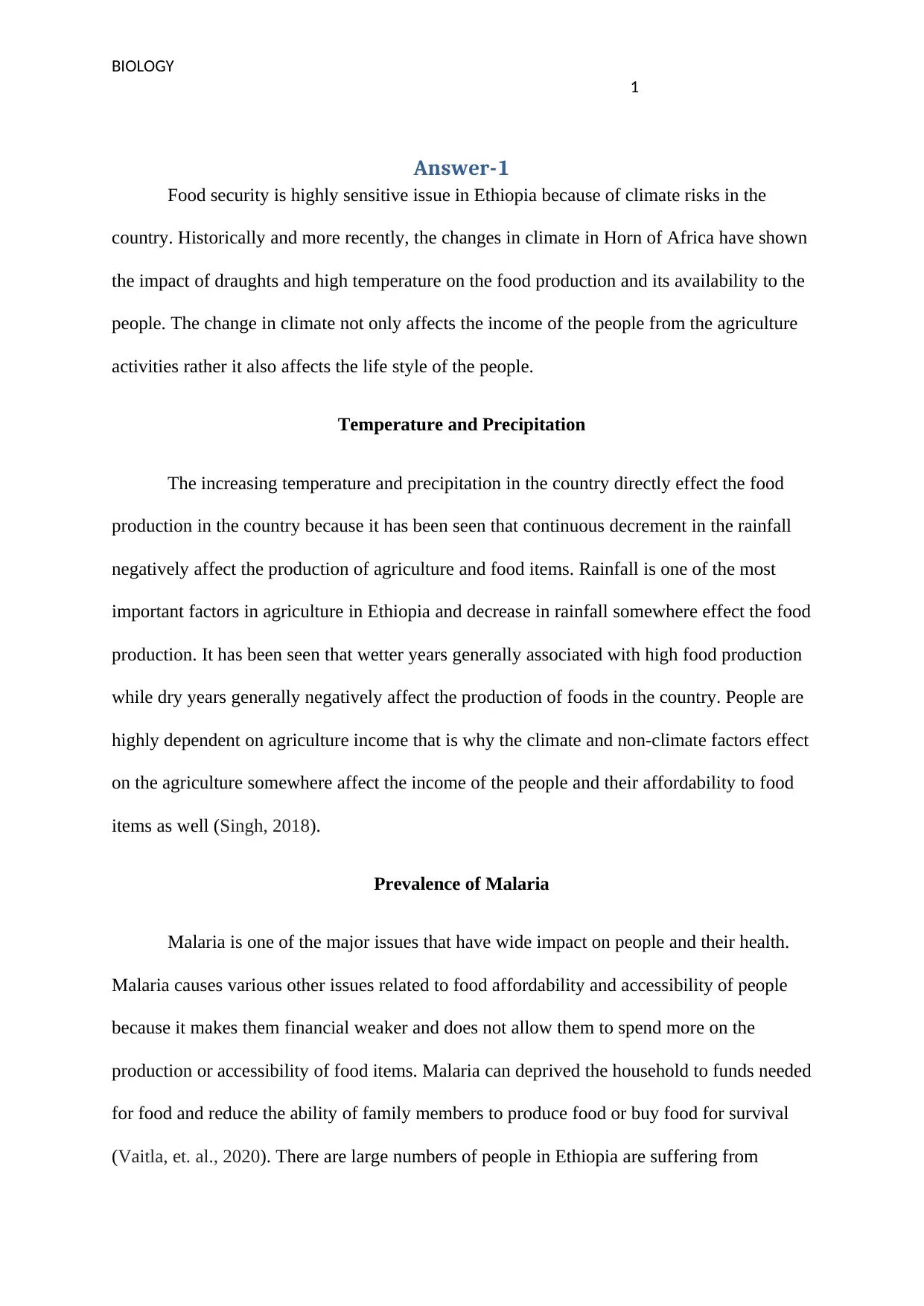
BIOLOGY
1
Answer-1
Food security is highly sensitive issue in Ethiopia because of climate risks in the
country. Historically and more recently, the changes in climate in Horn of Africa have shown
the impact of draughts and high temperature on the food production and its availability to the
people. The change in climate not only affects the income of the people from the agriculture
activities rather it also affects the life style of the people.
Temperature and Precipitation
The increasing temperature and precipitation in the country directly effect the food
production in the country because it has been seen that continuous decrement in the rainfall
negatively affect the production of agriculture and food items. Rainfall is one of the most
important factors in agriculture in Ethiopia and decrease in rainfall somewhere effect the food
production. It has been seen that wetter years generally associated with high food production
while dry years generally negatively affect the production of foods in the country. People are
highly dependent on agriculture income that is why the climate and non-climate factors effect
on the agriculture somewhere affect the income of the people and their affordability to food
items as well (Singh, 2018).
Prevalence of Malaria
Malaria is one of the major issues that have wide impact on people and their health.
Malaria causes various other issues related to food affordability and accessibility of people
because it makes them financial weaker and does not allow them to spend more on the
production or accessibility of food items. Malaria can deprived the household to funds needed
for food and reduce the ability of family members to produce food or buy food for survival
(Vaitla, et. al., 2020). There are large numbers of people in Ethiopia are suffering from
1
Answer-1
Food security is highly sensitive issue in Ethiopia because of climate risks in the
country. Historically and more recently, the changes in climate in Horn of Africa have shown
the impact of draughts and high temperature on the food production and its availability to the
people. The change in climate not only affects the income of the people from the agriculture
activities rather it also affects the life style of the people.
Temperature and Precipitation
The increasing temperature and precipitation in the country directly effect the food
production in the country because it has been seen that continuous decrement in the rainfall
negatively affect the production of agriculture and food items. Rainfall is one of the most
important factors in agriculture in Ethiopia and decrease in rainfall somewhere effect the food
production. It has been seen that wetter years generally associated with high food production
while dry years generally negatively affect the production of foods in the country. People are
highly dependent on agriculture income that is why the climate and non-climate factors effect
on the agriculture somewhere affect the income of the people and their affordability to food
items as well (Singh, 2018).
Prevalence of Malaria
Malaria is one of the major issues that have wide impact on people and their health.
Malaria causes various other issues related to food affordability and accessibility of people
because it makes them financial weaker and does not allow them to spend more on the
production or accessibility of food items. Malaria can deprived the household to funds needed
for food and reduce the ability of family members to produce food or buy food for survival
(Vaitla, et. al., 2020). There are large numbers of people in Ethiopia are suffering from
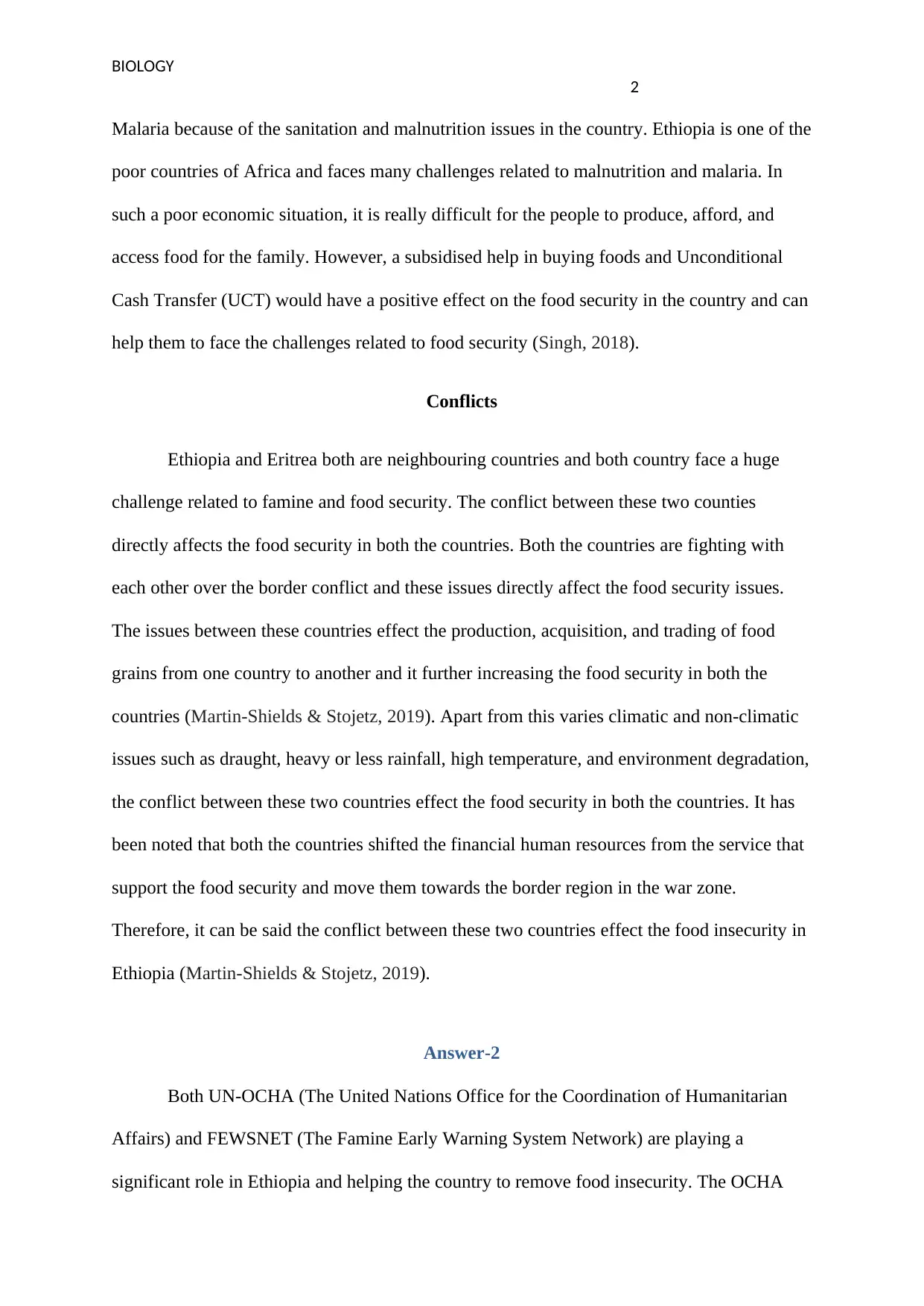
BIOLOGY
2
Malaria because of the sanitation and malnutrition issues in the country. Ethiopia is one of the
poor countries of Africa and faces many challenges related to malnutrition and malaria. In
such a poor economic situation, it is really difficult for the people to produce, afford, and
access food for the family. However, a subsidised help in buying foods and Unconditional
Cash Transfer (UCT) would have a positive effect on the food security in the country and can
help them to face the challenges related to food security (Singh, 2018).
Conflicts
Ethiopia and Eritrea both are neighbouring countries and both country face a huge
challenge related to famine and food security. The conflict between these two counties
directly affects the food security in both the countries. Both the countries are fighting with
each other over the border conflict and these issues directly affect the food security issues.
The issues between these countries effect the production, acquisition, and trading of food
grains from one country to another and it further increasing the food security in both the
countries (Martin-Shields & Stojetz, 2019). Apart from this varies climatic and non-climatic
issues such as draught, heavy or less rainfall, high temperature, and environment degradation,
the conflict between these two countries effect the food security in both the countries. It has
been noted that both the countries shifted the financial human resources from the service that
support the food security and move them towards the border region in the war zone.
Therefore, it can be said the conflict between these two countries effect the food insecurity in
Ethiopia (Martin-Shields & Stojetz, 2019).
Answer-2
Both UN-OCHA (The United Nations Office for the Coordination of Humanitarian
Affairs) and FEWSNET (The Famine Early Warning System Network) are playing a
significant role in Ethiopia and helping the country to remove food insecurity. The OCHA
2
Malaria because of the sanitation and malnutrition issues in the country. Ethiopia is one of the
poor countries of Africa and faces many challenges related to malnutrition and malaria. In
such a poor economic situation, it is really difficult for the people to produce, afford, and
access food for the family. However, a subsidised help in buying foods and Unconditional
Cash Transfer (UCT) would have a positive effect on the food security in the country and can
help them to face the challenges related to food security (Singh, 2018).
Conflicts
Ethiopia and Eritrea both are neighbouring countries and both country face a huge
challenge related to famine and food security. The conflict between these two counties
directly affects the food security in both the countries. Both the countries are fighting with
each other over the border conflict and these issues directly affect the food security issues.
The issues between these countries effect the production, acquisition, and trading of food
grains from one country to another and it further increasing the food security in both the
countries (Martin-Shields & Stojetz, 2019). Apart from this varies climatic and non-climatic
issues such as draught, heavy or less rainfall, high temperature, and environment degradation,
the conflict between these two countries effect the food security in both the countries. It has
been noted that both the countries shifted the financial human resources from the service that
support the food security and move them towards the border region in the war zone.
Therefore, it can be said the conflict between these two countries effect the food insecurity in
Ethiopia (Martin-Shields & Stojetz, 2019).
Answer-2
Both UN-OCHA (The United Nations Office for the Coordination of Humanitarian
Affairs) and FEWSNET (The Famine Early Warning System Network) are playing a
significant role in Ethiopia and helping the country to remove food insecurity. The OCHA
⊘ This is a preview!⊘
Do you want full access?
Subscribe today to unlock all pages.

Trusted by 1+ million students worldwide
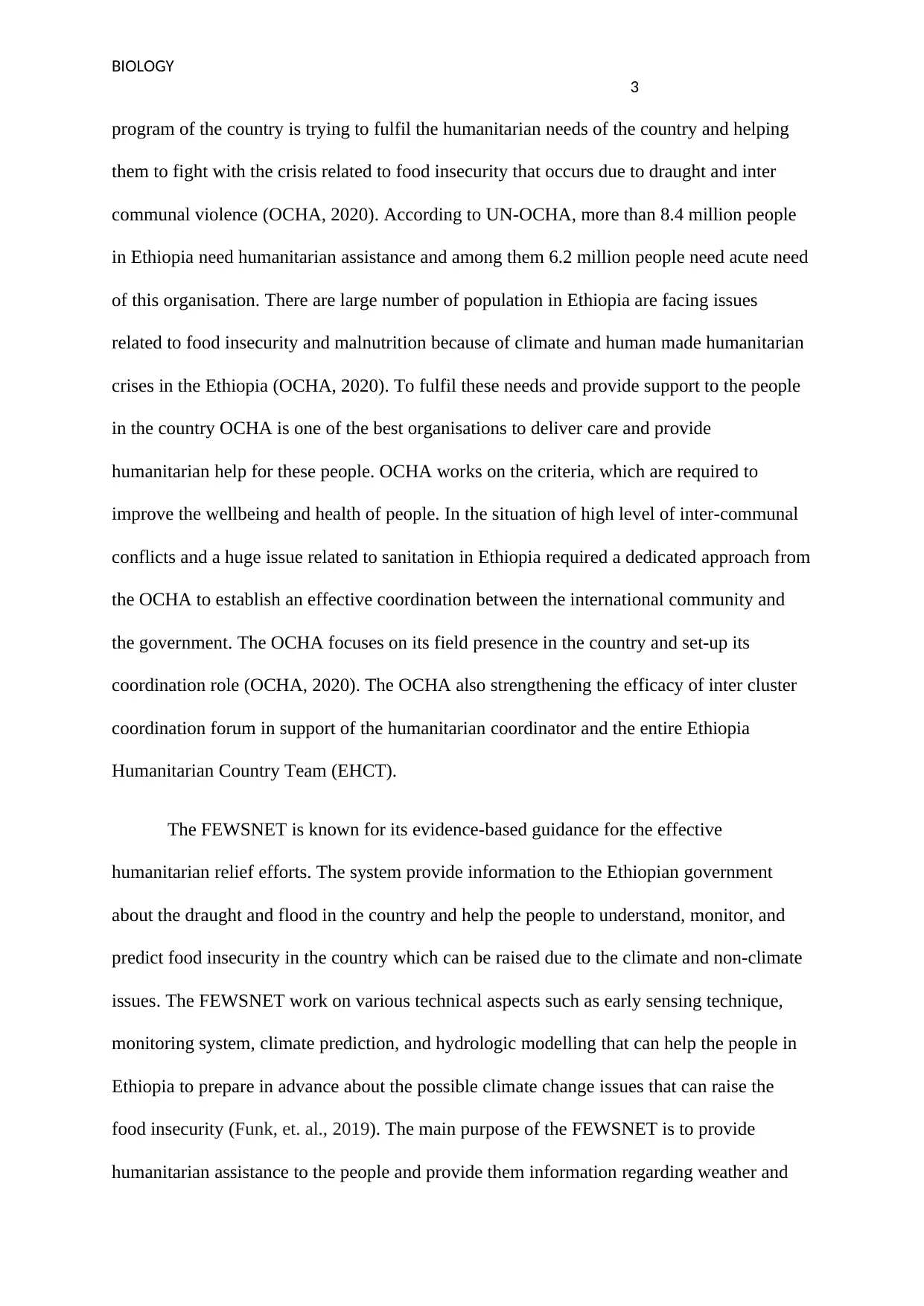
BIOLOGY
3
program of the country is trying to fulfil the humanitarian needs of the country and helping
them to fight with the crisis related to food insecurity that occurs due to draught and inter
communal violence (OCHA, 2020). According to UN-OCHA, more than 8.4 million people
in Ethiopia need humanitarian assistance and among them 6.2 million people need acute need
of this organisation. There are large number of population in Ethiopia are facing issues
related to food insecurity and malnutrition because of climate and human made humanitarian
crises in the Ethiopia (OCHA, 2020). To fulfil these needs and provide support to the people
in the country OCHA is one of the best organisations to deliver care and provide
humanitarian help for these people. OCHA works on the criteria, which are required to
improve the wellbeing and health of people. In the situation of high level of inter-communal
conflicts and a huge issue related to sanitation in Ethiopia required a dedicated approach from
the OCHA to establish an effective coordination between the international community and
the government. The OCHA focuses on its field presence in the country and set-up its
coordination role (OCHA, 2020). The OCHA also strengthening the efficacy of inter cluster
coordination forum in support of the humanitarian coordinator and the entire Ethiopia
Humanitarian Country Team (EHCT).
The FEWSNET is known for its evidence-based guidance for the effective
humanitarian relief efforts. The system provide information to the Ethiopian government
about the draught and flood in the country and help the people to understand, monitor, and
predict food insecurity in the country which can be raised due to the climate and non-climate
issues. The FEWSNET work on various technical aspects such as early sensing technique,
monitoring system, climate prediction, and hydrologic modelling that can help the people in
Ethiopia to prepare in advance about the possible climate change issues that can raise the
food insecurity (Funk, et. al., 2019). The main purpose of the FEWSNET is to provide
humanitarian assistance to the people and provide them information regarding weather and
3
program of the country is trying to fulfil the humanitarian needs of the country and helping
them to fight with the crisis related to food insecurity that occurs due to draught and inter
communal violence (OCHA, 2020). According to UN-OCHA, more than 8.4 million people
in Ethiopia need humanitarian assistance and among them 6.2 million people need acute need
of this organisation. There are large number of population in Ethiopia are facing issues
related to food insecurity and malnutrition because of climate and human made humanitarian
crises in the Ethiopia (OCHA, 2020). To fulfil these needs and provide support to the people
in the country OCHA is one of the best organisations to deliver care and provide
humanitarian help for these people. OCHA works on the criteria, which are required to
improve the wellbeing and health of people. In the situation of high level of inter-communal
conflicts and a huge issue related to sanitation in Ethiopia required a dedicated approach from
the OCHA to establish an effective coordination between the international community and
the government. The OCHA focuses on its field presence in the country and set-up its
coordination role (OCHA, 2020). The OCHA also strengthening the efficacy of inter cluster
coordination forum in support of the humanitarian coordinator and the entire Ethiopia
Humanitarian Country Team (EHCT).
The FEWSNET is known for its evidence-based guidance for the effective
humanitarian relief efforts. The system provide information to the Ethiopian government
about the draught and flood in the country and help the people to understand, monitor, and
predict food insecurity in the country which can be raised due to the climate and non-climate
issues. The FEWSNET work on various technical aspects such as early sensing technique,
monitoring system, climate prediction, and hydrologic modelling that can help the people in
Ethiopia to prepare in advance about the possible climate change issues that can raise the
food insecurity (Funk, et. al., 2019). The main purpose of the FEWSNET is to provide
humanitarian assistance to the people and provide them information regarding weather and
Paraphrase This Document
Need a fresh take? Get an instant paraphrase of this document with our AI Paraphraser
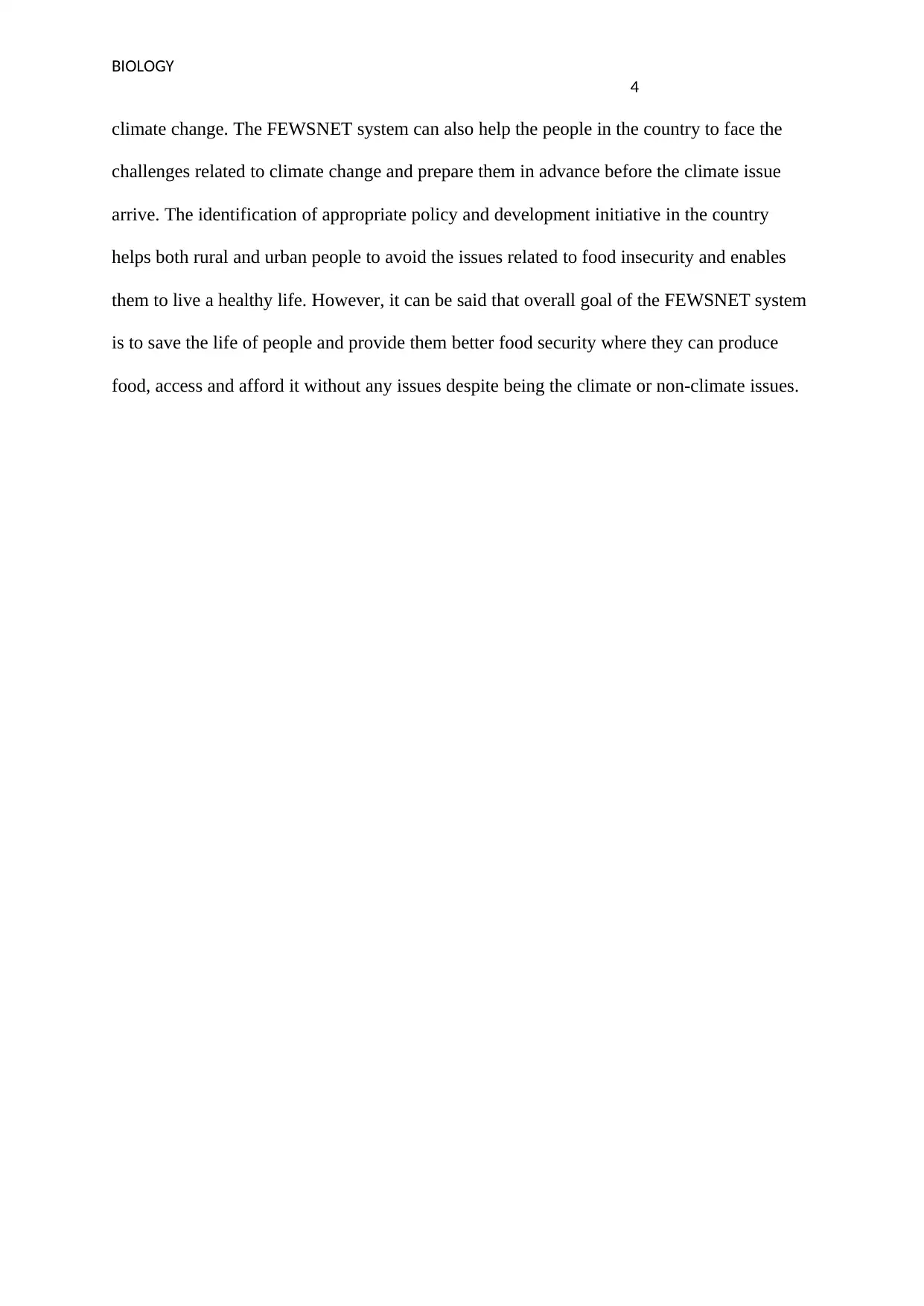
BIOLOGY
4
climate change. The FEWSNET system can also help the people in the country to face the
challenges related to climate change and prepare them in advance before the climate issue
arrive. The identification of appropriate policy and development initiative in the country
helps both rural and urban people to avoid the issues related to food insecurity and enables
them to live a healthy life. However, it can be said that overall goal of the FEWSNET system
is to save the life of people and provide them better food security where they can produce
food, access and afford it without any issues despite being the climate or non-climate issues.
4
climate change. The FEWSNET system can also help the people in the country to face the
challenges related to climate change and prepare them in advance before the climate issue
arrive. The identification of appropriate policy and development initiative in the country
helps both rural and urban people to avoid the issues related to food insecurity and enables
them to live a healthy life. However, it can be said that overall goal of the FEWSNET system
is to save the life of people and provide them better food security where they can produce
food, access and afford it without any issues despite being the climate or non-climate issues.
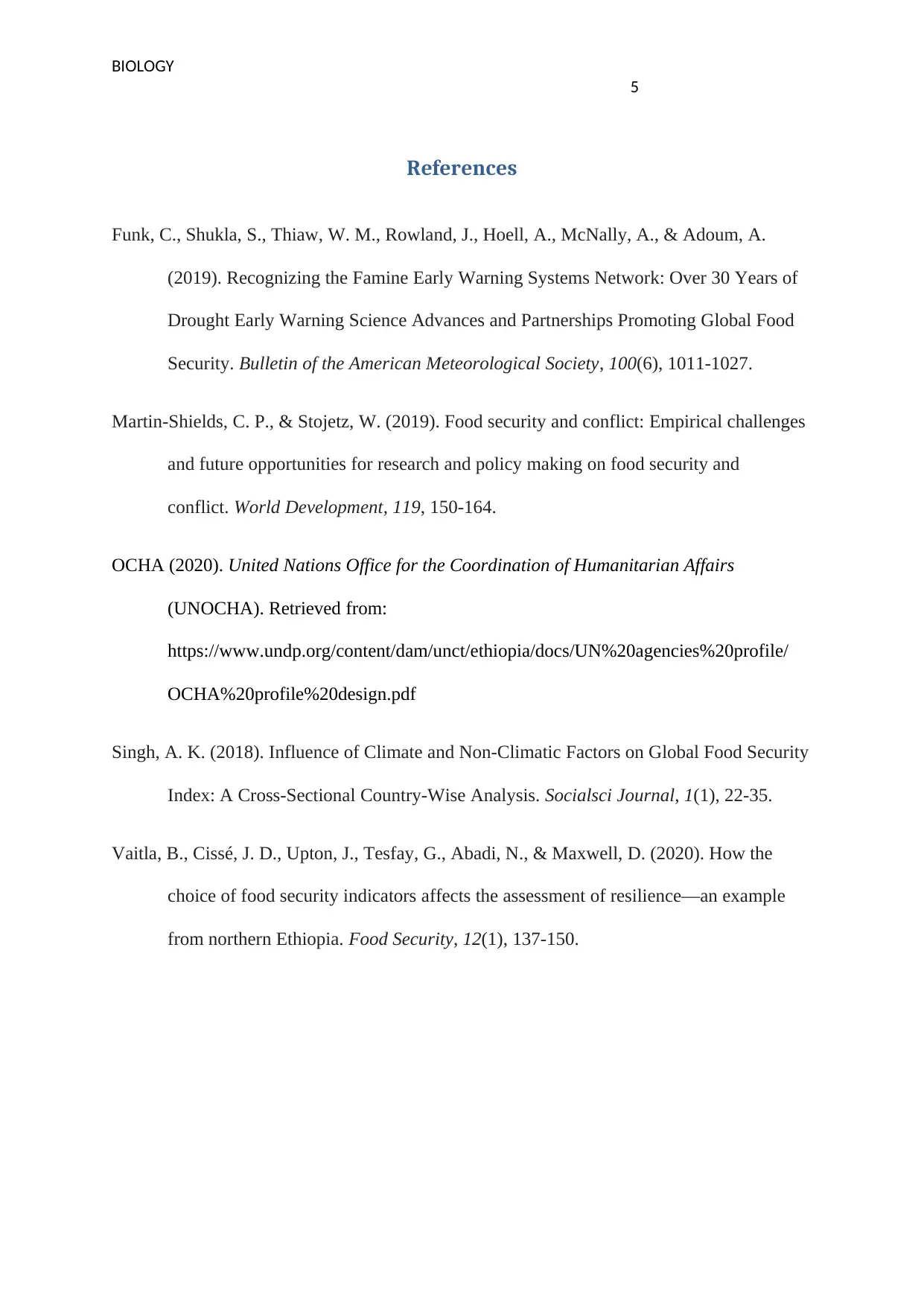
BIOLOGY
5
References
Funk, C., Shukla, S., Thiaw, W. M., Rowland, J., Hoell, A., McNally, A., & Adoum, A.
(2019). Recognizing the Famine Early Warning Systems Network: Over 30 Years of
Drought Early Warning Science Advances and Partnerships Promoting Global Food
Security. Bulletin of the American Meteorological Society, 100(6), 1011-1027.
Martin-Shields, C. P., & Stojetz, W. (2019). Food security and conflict: Empirical challenges
and future opportunities for research and policy making on food security and
conflict. World Development, 119, 150-164.
OCHA (2020). United Nations Office for the Coordination of Humanitarian Affairs
(UNOCHA). Retrieved from:
https://www.undp.org/content/dam/unct/ethiopia/docs/UN%20agencies%20profile/
OCHA%20profile%20design.pdf
Singh, A. K. (2018). Influence of Climate and Non-Climatic Factors on Global Food Security
Index: A Cross-Sectional Country-Wise Analysis. Socialsci Journal, 1(1), 22-35.
Vaitla, B., Cissé, J. D., Upton, J., Tesfay, G., Abadi, N., & Maxwell, D. (2020). How the
choice of food security indicators affects the assessment of resilience—an example
from northern Ethiopia. Food Security, 12(1), 137-150.
5
References
Funk, C., Shukla, S., Thiaw, W. M., Rowland, J., Hoell, A., McNally, A., & Adoum, A.
(2019). Recognizing the Famine Early Warning Systems Network: Over 30 Years of
Drought Early Warning Science Advances and Partnerships Promoting Global Food
Security. Bulletin of the American Meteorological Society, 100(6), 1011-1027.
Martin-Shields, C. P., & Stojetz, W. (2019). Food security and conflict: Empirical challenges
and future opportunities for research and policy making on food security and
conflict. World Development, 119, 150-164.
OCHA (2020). United Nations Office for the Coordination of Humanitarian Affairs
(UNOCHA). Retrieved from:
https://www.undp.org/content/dam/unct/ethiopia/docs/UN%20agencies%20profile/
OCHA%20profile%20design.pdf
Singh, A. K. (2018). Influence of Climate and Non-Climatic Factors on Global Food Security
Index: A Cross-Sectional Country-Wise Analysis. Socialsci Journal, 1(1), 22-35.
Vaitla, B., Cissé, J. D., Upton, J., Tesfay, G., Abadi, N., & Maxwell, D. (2020). How the
choice of food security indicators affects the assessment of resilience—an example
from northern Ethiopia. Food Security, 12(1), 137-150.
⊘ This is a preview!⊘
Do you want full access?
Subscribe today to unlock all pages.

Trusted by 1+ million students worldwide
1 out of 6
Related Documents
Your All-in-One AI-Powered Toolkit for Academic Success.
+13062052269
info@desklib.com
Available 24*7 on WhatsApp / Email
![[object Object]](/_next/static/media/star-bottom.7253800d.svg)
Unlock your academic potential
Copyright © 2020–2026 A2Z Services. All Rights Reserved. Developed and managed by ZUCOL.



